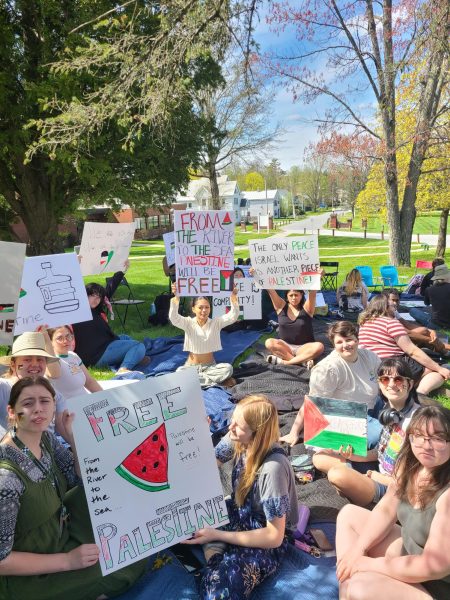The question of economics
Economics is generally taught as an objective, non-political science. It’s not.
This spring I took an economics course through NVU Online. This particular class stuck pretty closely to a mainstream textbook, Gregory Mankiw’s Principles of Economics. As I looked under the surface, I saw that despite its neutral language, it promoted certain values. These values include individuality, self-interest, materialism, efficient and plentiful production of goods and services. These values are the status quo in much of our culture and economy. I would argue that they have led us down unsustainable paths that cause mass poverty and inequality, environmental crises, and worker exploitation.
I don’t want to imply that all economics classes take these values for granted. But mine did. I think that’s not uncommon, and I think that’s terrifying when you imagine the policymakers these classes are sending off into the world. So if you are an economics student, here are some grains of salt to take with your mainstream economic orthodoxy.
Economics is based on assumptions. Mainstream economics admits as much. And that’s not necessarily a bad thing. Mankiw’s book presents assumptions and economic models as ways to simplify and gain broad insights, since it would be impossible to focus on all the granular variables at the same time. When we put economics to use in the real world, we can add back in the relevant variables that are omitted.
Every time I pointed out issues I saw with the textbook’s assertions, I would be told, “We’re using assumptions, it’s not supposed to be the real world.” I have no problem with this in theory. However, there are three big problems I’ve found with this explanation in practice:
Some assumptions are flat out wrong. For an assumption to be useful, it should be true a solid majority of the time. Otherwise it doesn’t give us any insight.
Assumptions reflect values, even if they sound neutral.
Economists are generally pretty awful at adding real world complications back into their models when creating policy. Economics, being an insular field, comes to mistake its assumptions for reality. They run the real world like an abstract economic model.
This is a fundamental assumption in economics: “People behave rationally.” Pretty much every economic model and formula takes this for granted. Unfortunately, it is subject to all three of these flaws.
People contain a whole host of contradictory and counterproductive instincts. We’re not evolved to deal with the modern world, and many of our brains’ reactions to it are poorly adapted from Paleolithic era instincts. Refined sugars are bad for us, but we eat them anyways. If I take a day off from my job, I might not use it in a way that adds the maximum value to my life, as the economic concept of opportunity cost posits. Instead I might procrastinate, or stay in bed watching stupid YouTube videos. I have many things I’d rather do, but I don’t always have the discipline. So the idea that people behave rationally is just false.
Economists’ concept of ‘rational’ is also loaded with implicit values. In the first chapter, the textbook nods to the idea that people can find value in things like resting or reading a book. But in every single economic model after that, rationality means getting the most money and getting the most value for that money. According to this definition, a rational billionaire would try to keep making money as quickly as possible, and still buy the cheapest pasta they can find whenever they want to make spaghetti. Somehow, I doubt that would actually add value to their life. In addition, there is no place in this definition for community or reciprocity.
Personally, I know the most valuable parts of my life come from feeling like I’m a part of a community. Lots of value comes from contributing to community, earning social capital, and strengthening interpersonal bonds. This comes in the form of warm fuzzy feelings, but also in resource sharing, and needs being met outside the monetary system. This shows up in economic models as bad for the economy, since people aren’t earning money or acquiring value from that money.
Lastly, economists don’t factor complex human desires and behaviors back into their economic policy. For example, most economists support unrestricted free trade. They say it allows nations to specialize, resulting in more efficient production, which adds wealth to the economy. Under this scenario, a ‘rational’ person will work in the most profitable field, which is now specialized, and be happy about it because it’s more profitable than what they were doing before. This ignores a ton of real world variables. A global trade economy can decimate small, local, often indigenous economies. These communities produce much of their value through reciprocity and social bonds. After free trade, a community may have more money, but lower quality of life. Trade can also encourage countries to eliminate environmental and labor standards so they can be more competitive with their specialized production.
This is bad for exploited workers, plus anyone who likes having an ecosystem that can support life. I am not advocating against trade in all circumstances, but these are factors to be careful about when negotiating specifics of trade deals.
All this only covers the very first assumption in economics. As my course progressed, it was chock full of faulty assumptions.
One of the most pernicious parts of Mankiw’s book is the intent focus on creating more wealth through efficient and plentiful production. It briefly acknowledges concerns of equality and externalities (social harm or benefit that is not included in a price, e.g. carbon emissions). But after that, it mostly talks about maximizing profit and production.
We see a host of bad social outcomes when those priorities become policy. We produce far more than we need to survive and live comfortably. To make use of all this production we have to artificially inflate demand by creating markets for useless things (e.g. luxury items that only serve as status symbols), or preplanned obsolescence. This uses lots of energy and creates lots of waste, which wreaks havoc on our climate and natural environment. And even with all this maximized efficiency creating loads of wealth, our distribution systems still leave us with massive inequality and poverty. To top it off, increases in efficiency often create decreases in work enjoyment (it’s often more efficient to give workers less relaxation time, or to standardize a table making process instead of letting woodworkers express creativity through their craft).
Essentially, mainstream economic doctrine has led us to a place where we are forcing people to work more at jobs they hate to produce shoddy or useless goods for a fraction of the money that their bosses are getting, all of which contributes to climate change and other natural devastation, which could lead to the end of human life on the planet. Whoops.

Senior, Professional Studies
Grew up in East Montpelier, VT
Fall 2019 - Present
In my spare time that I pretend I still have, I play saxophone...



